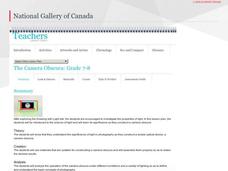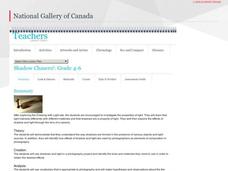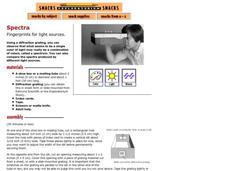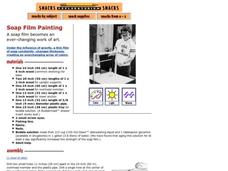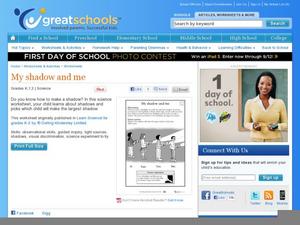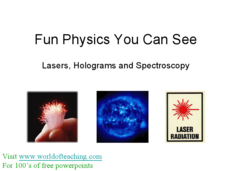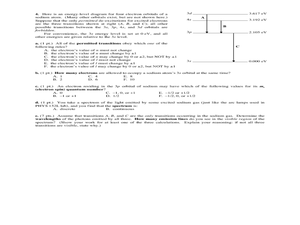IOP Institute of Physics
Physics in Concert
What do physicists and musicians have in common? A lot more than you might think. After first viewing a slide show presentation and completing a series of skills practice worksheets on the physics of light, sound, and electricity, young...
National Gallery of Canada
The Camera Obscura
You can create a camera with even the most unassuming materials. Learners view photographs and talk about the art. Some background information is included about the camera obscura for you to present before individuals make their own...
National Gallery of Canada
Shadow Chasers!
Experiment with light and shadow with a photography lesson. Learners first view several artistic photographs. They then play with different levels of light and various objects, eventually putting together compositions and taking pictures...
National Gallery of Canada
Make a Pinhole Camera
Introduce your class to photography by asking them to construct their own pinhole cameras. After putting together their own devices, pupils take and develop pictures and analyze the results. The plan provides step-by-step instructions...
National Gallery of Canada
Surprising Sun Prints
Here comes the sun! Composition, shapes, and the properties of light are the focus of this bright lesson. Class members examine art and then create sun prints using photosensitive paper and various objects of different shapes and sizes....
Exploratorium
Touch the Spring
Concave mirrors and the images they produce are traditional topics in the physics classroom. This resource explains how to set up an investigation of them, and it provides you with the explanation of concepts.
Exploratorium
Spectra
Make a class set of spectrum tubes by first purchasing some diffraction grating, and then constructing the tools with mailing tubes or shoe boxes. If you aren't up for assembling them, you could purchase prepared spectroscope kits. This...
Exploratorium
Soap Film Painting
If you are up for constructing a wooden frame, you can do this demonstration of the interference patterns when light reflects off of layers of soapy film. Both constructive and destructive interference can be seen as evidenced by the...
Exploratorium
Give and Take
Heat-sensitive liquid crystal sheets are available in a variety of sizes and temperature ranges. Purchase a class set of hand-held sheets and color half of each with a silver permanent marking pen. Learners of light can hold them under a...
Exploratorium
Corner Reflector
If you set up a triad of mirrors into a corner figuration, they act as a kaleidoscope, bouncing light waves back and forth indefinitely, changing the light that your eyes perceive. Although the materials required are very specific and...
Exploratorium
Bird in the Cage
When your life science class is learning about the eye and how it works, you can add this activity as a demonstration of how the retina holds an afterimage. After staring at a red, green, or blue bird shape, pupils glance at a cage and...
Exploratorium
Water Sphere Lens
With a Florence flask or fishbowl, make a double convex lens and use it to examine an image. Because of the refraction, the image will be inverted. A simple explanation is provided here for you to share with your class as they...
Curated OER
Sun and Shadows
Why do shadows look different in the summer than in the winter? What causes day and night? How can a sundial be used to tell time? Answer these questions and more through two engaging lessons about light and shadows. Fourth and fifth...
Curated OER
How Light Can "Bend"
Examine the properties of light with a fifth grade science experiment. Pupils find out how light bounces off the surface of a mirror, as well as how a periscope works. For the science investigation part, kids build their own periscope...
Curated OER
My Shadow and Me
Practice making shadows with a kindergarten science experiment. After deciding which picture would represent the biggest shadow, kids use a flashlight to experiment with their own shadows. For extra fun, have kids mark their shadows...
Curated OER
On The Light Side
Kindergartners identify different sources of light in a science activity. They view pictures of a flashlight, a match, and a lamp, among others, and color the part of the picture that creates light. A science activity prompts them to...
Curated OER
Being Shadowed
What causes a shadow to appear? Have kindergartners and first graders explore shadows with a fun science activity. After reading a short paragraph about light sources, they draw a shadow for a little girl based on the location of the...
Curated OER
Waves
Light waves and sound waves are the focus of this science lesson designed for 5th graders. Besides discovering how these waves travel, learners also discover the basic properties of waves, and analyze data tables and graphs. The...
Curated OER
Fun Physics You Can See
Fascinating aspects of electromagnetic radiation and its use in obtaining and transferring information are described here. Learners will find the connections to current technology interesting. Although the slides are text-heavy, they do...
Curated OER
Color at Light Speed
Rainbow science anyone? learners put the color specturm, frequency, light waves, and wavelengths into a light speed context. They use algebraic formulas to determine the speed of each light wave length. A great way to connect math and...
Curated OER
Energy
Wow! Colorful and simple, these 160 slides introduce the various forms of energy, along with a relevant image. Some of the images are animations, which help beginning physical scientists to visualize the flow of electrons or energy! This...
Curated OER
Color
An interesting set of details about the light spectrum, these slides explain how objects reflect and absorb light to affect how they appear to the human eye. The differences in mixing lights or pigments is explained and some everyday...
Curated OER
Physics 152 Fall 2004 Final Exam, Parts A, B, C, D
At the end of a general physics course focused on light and electricity, you can administer this exam. Concepts covered include electromagnetism, circuits, induction, light rays, lenses and mirrors, characteristics of light, electron...
Curated OER
Physics 152 ~ Fall 2003 Midterm Exam #3, Parts A, B
Illuminated physics stars show what they know about light by taking this exam. They match several related vocabulary terms to descriptions and answer multiple choice questions about the characteristics of light, magnification, and...



